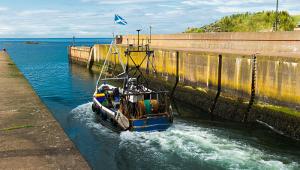The Public Accounts Committee has also criticised the government for the “secrecy surrounding discussions” on ports post Brexit, which it said was “hampering businesses to plan”.
Business may have to change the way they register trailers or apply for road haulage permits.
The PAC said because of the DfT's use of confidentiality agreements and not giving businesses enough detailed information, firms that transport goods were not being able to develop contingency plans.
“There is a real prospect of major disruption at our ports,” the report released today said.
“The slow progress and poor communication around work to avoid this concerns us.”
The PAC chair Meg Hillier said: “The secrecy around the department’s preparations, and the shortcomings in assurance on its progress, are a potentially toxic combination”.
The cross-party group of MPs expressed concern that legislation required before the UK leaves the EU may not be done in time.
DfT aims to pass 66 statutory instruments in relation to ports before the end of March 2019, but as of 24 October, the department had laid only 19 of the 66 before Parliament.
The report said: “There is a danger that required legislation will neither be subject to proper scrutiny, nor passed in time for EU exit”.
Hillier added: “With so little time remaining, there is still much to do. The risks associated with no-deal are severe, yet plans for avoiding disruption around major ports in particular are worryingly under-developed.”
The committee singled out the DfT’s £30-£35m plan to manage traffic and lorry-queuing at Dover’s port after Brexit, called Project Brock.
The government has still not carried out proposed desk-based testing of the system as part of the project, the PAC noted.
The PAC said that the DfT must be more open about the challenges it faces and work with businesses and stakeholders to help them get ready for “whatever the future brings”.
The report criticised the department for not liaising “directly with other English ports [other than Dover] and their related local authorities”.
The money for Project Brock was part of the £75.8m given to the DfT for 2018-19 on EU exit work.
A DfT spokesperson hit back at the PAC's claims, saying “We disagree with the committee’s conclusions, which are not accurate. ”
They added “extensive work" had been done through Project Brock and that “good progress in implementing required parliamentary legislation” had been made.
A recent National Audit Office report found that a no-deal Brexit would put £40bn worth of tax and duty collected at UK borders at risk.











